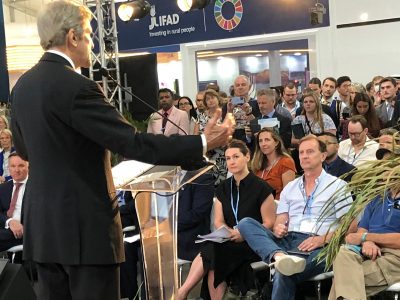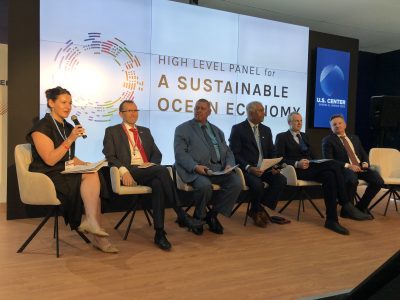 |
 |
Norway and Palau founded this “High Level Panel on the Sustainable Ocean Economy” in 2018. It includes a group of heads of states and 15 countries. John Kerry introduced speakers and the moderator, Eliza Northrup, Secretariat to the Ocean Panel. Panel members in the photo include senior officials of the governments of member nations:
Espen Barth Eide, Minister for Climate and the Environment, Norway
Derek Klazen, Minister for Fisheries and Marine Resources, Namibia
Ambassador Dr. Satendra Prasad, Permanent Mission of Fiji to the UN
Lord Zacharias Goldsmith, Minister for Energy, Climate, and Environment, UK
Chris Bowen, Minister for Climate Change and Energy, Australia
Last month, CIRCA’s Exec. Director Jim O’Donnell helped lead a UConn contingent, including 14 students, to the 27th United Nations Conference of Parties Climate Conference (COP) taking place in Sharm El Sheikh, Egypt. The COP is an opportunity for world climate experts, activists, and leaders to meet and discuss measures to act in the face of the climate crisis. Following is a summary of a high level panel on a “Sustainable Ocean Economy” and reflections from Dr. O’Donnell who attended the panel, introduced by John Kerry, U.S. Special Presidential Envoy for Climate…
The discussion of wind power, and hydrogen- green shipping unexpectedly resonated with me since these are all very relevant to the future of Connecticut’s economy. The development of the New London State Pier as a hub for the construction and maintenance of wind turbine fields is major initiative of the state and I realize now how essential it will be. Similarly, I see the University’s commitment to research on hydrogen as a fuel seems a wise strategy much more clearly now than I did a few weeks ago. The transition to a carbon-free economy remains challenging, but it creates many new opportunities for innovation and its good to see Connecticut at the center of some of them. But deploying them rapidly in the near future will be essential if the greater that 1.5C of warming is to be avoided. Here is a short summary of the panel discussion including a few thoughts of mine:
US Special Presidential Envoy for Climate introductory remarks called for a pledge from all countries to preserve 30% of all waters in their jurisdictions, and for the world to limit warming to 1.5C. He also noted the need for “green shipping” or zero emission ships. He also reminded everyone that the US has a goal is to generate 30 GW of offshore wind power by 2030 and 50 GW more of wind of energy on floating platform by 2035. Note that Millstone currently generates about 2 GW and is about half of CT’s needs. CT plans to generate 2GW from wind by 2030. Existing construction will lead to approximately 0.8GW. The Commissioner of CTDEEP has been quoted as expecting the need to be 5 GW by 2040.
Norway’s Minister for Climate and the Environment, Espen Barth Eide, began the panel by describing the Green Shipping Challenge, launched in the first week of COP27 by the USA and Norway. The greenhouse gas emitted by the global shipping industry exceeds that of Iran and Germany, currently the countries with the eighth and nineth largest national emissions. The challenge is to entirely decarbonize shipping by 2050 and the minister pointed out that several Norwegian shipping lines are already only ordering dual fuel vessels so that they will be ready for the transition. I later visited the Norway Pavilion and learned about companies that have designed and are building prototypes of massive ocean-going cargo carries with rigid sails. Minister Eide also noted that this initiative builds on the Clydebank Declaration of COP26 that committed countries to providing clean fuel facilities at all major ports.
Australia’s Minister Bowen pointed out that 99% of its trade by volume is shipped and was happy that Australia had joined the Green Shipping Challenge. Australia has aligned its Hydrogen hubs with port and industrial areas since it is likely to be a major element of the decarbonization strategy. They are also prioritizing the development of “Green Shipping Corridors” to major trading partners in Singapore and Indonesia. He also noted that the Australian Government was now accelerating the development of offshore wind electricity generation, which for a country with large coal reserves, is a very positive sign.
Lord Zacharias Goldsmith, the UK’s Minister for Energy, Climate, and Environment endorsed the Green Shipping Challenge and reported that the UK is developing 5 Green Corridors. The UK is a leader in the deployment of ocean-based wind generation a noted that only a few years ago he had thought that the industry would need a subsidy to develop until 2042, however, the costs have come down much faster than expected, 70% since 2015, and is now almost equivalent in cost to carbon based sources. He noted that the UK currently generates 13.1 GW from offshore wind and estimates show that all of the UK electricity needs could be provided by wind power.
Derek Klazen, Minister for Fisheries and Marine Resources for Namibia focused his remarks on the critical need effectively manage fisheries. Namibia is anticipating expanding marine protected areas in its exclusive economic zone and is increasing penalties for violators. It is also collaborating with adjacent countries to protect offshore waters. Ambassador Dr. Satyendra Prasad, Permanent Mission of Fiji to the UN, emphatically noted that “There is no future for the ocean that we can contemplate beyond 1.5 C”. He described numerous products and services that will be devastated if warming exceeds 1.5C. He concluded that the technology needed for the goal is available, and Lord Goldsmith later agreed, but that financing for implementation is inadequate.